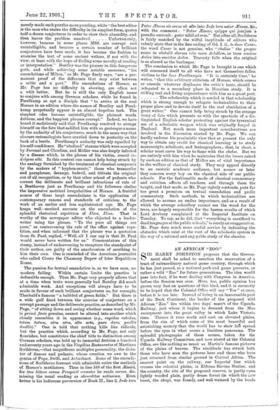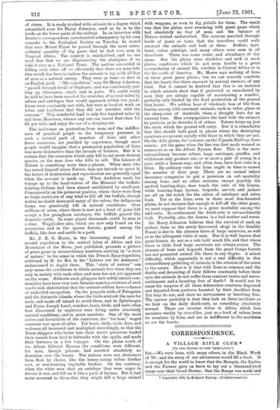AN AFRICAN "ZOO."
--) IR HARRY JOHNSTON proposes that the G-overn- 1.ment shall be asked to sanction the reservation of a tract of extraordinary natural game country, through which he has just passed, as a national park and game preserve, or rather a wild " Zoo " for future generations. The idea would pass into fact, if he were dealing with Congress in America, before the Session was over. Here, too, public opinion has grown very fast on questions of this kind, and it is earnestly to be hoped that the Colonial Office will say " Yes " at once, before it is too late. Instead of being in an inaccessible part of the Dark Continent, the border of the proposed wild African " Zoo " lies within two days' march of the Uganda Railway, just where it begins to descend from the Mao escarpment into the great valley in which Lake Victoria rises. Thence it runs north and east on elevated plains, from the rim of which some of the most beautiful and astonishing scenery that the world has to show lie t spread before the eyes in what seems a limitless panorama. The splendid photographs of these scenes, taken for the Uganda Railway Committee, and now stored at the Colonial Office, are like nothing so much as Martin's famous pictures of the plains of heaven. The similitude has struck both those who have seen the pictures here and those who have just returned from similar ground in Central Africa. The nearest point on the railway, our Imperial line which crosses the celestial plains, is Eldoma Ravine Station, and the country, the site of the proposed reserve, is partly cpen lightly wooded plain, partly dense forest (in which the new beast, the okapi, was found), and well watered by the heads of rivers. It is ready stocked with animals to a degree which astonished even Sir Harry Johnston, used as he is to the herds on the lower parts of the railway. In an interview with Reuter's correspondent, corroborated subsequently by his own remarks to the Zoological Society on Tuesday, he stated that near Mount Elgon he passed through the most extra- ordinary quantity of big game that he had ever seen in Tropical Africa. The country is uninhabited, and no one need fear that we are dispossessing the aborigines if we take it over as a National Trust. The natives succeeded in killing each other off so effectually that there are none left. One result has been to induce the animals to lay aside all fear of man as a natural enemy. They were as tame as deer in an English park. "My expedition," says Sir Harry Johnston, "passed through herds of elephants, and was continually put- ting up rhinoceros, singly and in pairs. We could really be said to have been escorted for stretches of several miles by zebras and antelopes that would approach within ten yards. Lions were constantly met with, but were so hard at work on Zebra and hartbeest that they did not interfere with the caravan." This wonderful land is only five hundred miles by rail from Mombasa, whence any one can travel first-class for 3d. per mile, and enjoy the use of a sleeping-car.
The insistence on protection from man, and the indiffer- ence of practical people to the temporary presence in such a natural park of numbers of lions and other fierce carnivora, are justified by experience, though most people would imagine that a permanent population of lions was more destructive than the inroads of hunters. But it is certain that the creatures which only kill to eat never destroy species, as the man does who kills to sell. The balance of Nature is something more than a phrase. When man, who has raised himself above Nature, does not intrude to upset it, the forces of destruction and reproduction are generally equal when the account is made up. When Audubon made his voyage up to the head-waters of the Missouri the buffalo- hunting Indians had been almost annihilated by small-pox. Consequently on the primeval prairies, where there were then no large carnivora of any kind to kill off the buffalo, though wolves no doubt destroyed many of the calves, the indigenous fauna was practically left in natural conditions. Over millions of acres, where there is now not a head of game left except a few pronghorn antelopes, the buffalo grazed like domestic cattle. In some places thousands could be seen at a time. Wapiti-deer also, which are now only found on the mountains and in the spruce forests, grazed among the buffalo, like deer and cattle in a park.
Mr. E. S. Moore, in the interesting record of his second expedition to the central lakes of Africa and the Mountains of the Moon, just published, presents a picture of great game in extraordinary numbers, existing in "a state • of nature," in the sense in which the French Encycloptedists, criticised by M. Le Roi in his " Lettres sur lea Animaux," endeavoured to depict them. This "state of nature" can only mean the conditions in which animals live when they are only in society with each other, and man has not yet appeared on the scene. Hitherto such glimpses into solely animal com- munities have been very rare, because man is a creature of such world-wide distribution that the animals seldom have a chance of undivided occupation. On the penguin reefs of Patagonia and the Antarctic islands, where the birds mistook the men for seals, and made off inland to avoid them, and in Spitsbergen and Franz Joseph Land, reindeer, bears, birds, and seals when first discovered by explorers were living under absolutely natural conditions, and in great numbers. One of the most active and formidable of the carnivora, the "ice bear," waged constant war upon all alike. Yet bears, birds, seals, deer, and walruses all increased and multiplied exceedingly, so that the Norse skippers who broke into their Arctic preserves loaded their vessels from heel to bulwarks with the spoils, and made their fortunes in a few voyages. On the plains north of the Albert Edward Nyanza the conditions were different, for man, though present, had asserted absolutely no dominion over the beasts. The natives were not abstainers from flesh by choice, like the honey-eating tribes further east, or non-hunting vegetable feeders. On the contrary, when the white men shot an antelope they were eager to devour it raw, and fell on it like a pack of hyenas. But it had never occurred to therm that they might kill a large animal with weapons, or even to dig pitfalls for them. The result was that the plains were swarming with great game which had absolutely no fear of man, and the balance of Nature existed undisturbed. The caravan marched through herds of game so tame that the travellers could walk amongst the animals and look at them. Buffalo, hart- beest, cobus antelope, and many others were seen in all directions. There was some water, and abundance of dry grass. But the plains were shadeless and arid in most places, conditions which do not seem hostile to a great accumulation of animal life, whether in Central Africa or in the far south of America. Mr. Moore says nothing of lions on these great game plains; but we can scarcely conclude that the beasts live there wavexed by natural enemies of any kind. But it cannot be doubted that this is an instance in which animals show that if protected or unmolested by man they are always capable of maintaining a number, probably only limited by the food production of the ground they haunt. We seldom hear of wholesale loss of life from famine among wild ruminant animals, such as takes place on the sheep-runs of Australia when a drought lasts for an unusual time. Man overpopulates the land with the animals he protects, as he denudes it of others. Nature keeps up just the stock which the ground will carry. But it is remarkable that this should hold good in places where the destroying carnivora are present equally with those in which they are not. On the Athi plains, for instance, on the Uganda Railway, lions swarm ; yet the game when the line was first made seemed as numerous as on the Albert Nyanza flats. This is the more extraordinary because zebras, large antelopes, giraffes, and wildebeest only produce one, or at most a pair of young in a year, while a, lioness may, and often does, have four cubs in a litter. By ordinary rules the lions ought in time to exceed the number of their prey. There are no animal infant insurance companies to put a premium on cub mortality among lions, and no other creature, except possibly the spotted hunting-dogs, dare touch the cubs of the lioness, while hunting-dogs, hyenas, leopards, servals, and jackals are all on the watch for the calves of antelopes and zebra foals. Yet as the lions, even in these most lion-haunted plains, do not increase fast enough to kill off the other game, we must suppose that there is a great mortality among the wild cubs. In confinement the death-rate is extraordinarily high. Probably, also, the lioness is a bad mother and nurse.
Sir Harry Johnston believes that the survival of such an archaic form as the newly discovered okapi in the Semliki Forest is due to the absence there of large carnivora, as well as to the infrequent visits of men. But it is well known that great forests do not as a rule hold much life, and that where there is little food large carnivora are always scarce. The absence of lions and leopards from the great Congo forests has not promoted animal life there in any degree. A minor difficulty, which apparently is not a real difficulty in this extraordinary gathering of animals, is the relation of the eaten to the eaters. How is it that with lions so common and the deaths and devouring of their fellows constantly before their eyes, the animals do not suffer from constant terror and nerve- excitement and a haunting fear of death ? It would not be cause for surprise if all these defenceless creatures dispersed and departed from pastures haunted by their deadliest foes. Yet they do not, and show no nervousness or besetting fear. The answer probably is that they look on these incidents as we look on the daily death-rate, as something absolutely normal. There are riverine tribes in Africa which lose members weekly by crocodiles, just as a herd of zebras loses its members by lions, and are as indifferent to the accidents as are the beasts.











































 Previous page
Previous page